11.12. Rimma Erkko: Trickster ja queer; Näkin groteski, erotisoitu toiseus
Tutkimuskeskus Narraren monitieteellinen kertomuksentutkimuksen seminaari jatkuu keskiviikkona 11.12. klo. 15:15.
Tila: Pinni B3109 tai Zoom (Link). (Meeting ID: 668 4700 7494 Passcode: 045076)
Trickster ja queer; Näkin groteski, erotisoitu toiseus
Rimma Erkon esitys tutkii Näkin hahmoa lastenkirjojen kuvituksissa ja sitä, millä tavoin Näkin queerius ja groteskit piirteet näkyvät hahmon visuaalisessa ilmeessä. Näkki on hyvin tunnettu suomalais-ugrilaisen kansantarinoiden hahmo, jota on kuitenkin tutkittu kirjallisuustieteellisestä näkökulmasta varsin vähän.
Näkin hahmo on erityisesti lastenkulttuurissa paljon käytetty, ja sillä on perinteisestikin peloteltu juuri lapsia. Esityksessä havainnollistetaan sitä, millä tavoin groteski ja queerius linkittyvät yhteen Näkin hahmossa ja miten tämä näkyy hahmon visuaalisessa ilmeessä lasten tietokirjoissa.
Rimma Erkko (FM) tutkii väitöskirjassaan groteskeja uskomustarinoita ja niiden adaptaatioita. Esitys liittyy hänen tekeillä olevaan väitöskirja-artikkeliinsa aiheesta.
Kertomuksentutkimuksen seminaari on kaikille avoin, ja sen tavoitteena on herätellä moni- ja poikkitieteistä keskustelua aineistoista, menetelmistä, teorioista ja tutkimuksen tilasta. Seminaarissa keskustellaan meneillään ja aluillaan olevista kertomukseen liittyvistä tutkimuksista. Jokainen kerta sisältää alustuksen (noin 20 min) sekä keskusteluosuuden. Esitelmöijät ovat eri uravaiheissa olevia Tampereen yliopiston tutkijoita.
4.12. Ville Hämäläinen: Fictionality Meets Paratextuality: “Intentionally Signaled, Communicated Invention” Redistinguished
This talk is a part of the Narrative Studies Seminar
Time: Wed 4 December 3:15 pm (EET); Place: Pinni B4113 or Zoom (Link). (Meeting ID: 668 4700 7494 Passcode: 045076)
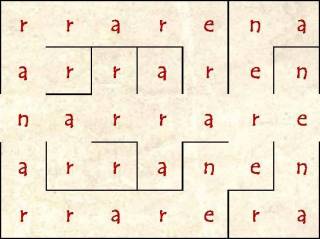
Fictionality Meets Paratextuality: “Intentionally Signaled, Communicated Invention” Redistinguished
This paper discusses Simona Zetterberg Gjerlevsen and Henrik Skov Nielsen’s (2020) rhetorical definition of fictionality as “an intentionally signaled communicated invention” in terms of paratextuality. Paratexts, such as the author’s name, titles, prefaces, etc., frame and guide the reception of the text in question (Genette 1997). Richard Walsh (2007), in his seminal work on the rhetoric of fictionality, emphasizes paratexts’ role in guiding the interpretation of the text as fictional or nonfictional. In contrast to Walsh’s contextual approach, Zetterberg and Nielsen seek to shift the notion to include the textual signaling of fictionality.
By presenting a case study of Søren Kierkegaard’s paratexts (pseudonymous names, and prefaces) in his philosophical writings (Concluding Unscientific Postscript and Prefaces), this paper shows how these paratexts perplex both paratextual and textual signaling of fictionality. In doing so, I will employ the notion of resignaling fictionality (Jacobsen 2022) and the distinction between global and local fictionality. In addition to signaling, I wish to investigate the uses and limits of intentionality, not to mention its intertwined relationship with signaling. Consequently, the presentation offers some critical but constructive remarks to improve the rhetoric of fictionality.
References
Genette, Gérard. 1997. Paratexts: Thresholds of Interpretation. Trans. Jane E. Lewin. Literature, Culture, Theory 20. Cambridge: University Press.
Gjerlevsen, Simona Zetterberg & Henrik Skov Nielsen. 2020. “Distinguishing Fictionality.” In Exploring Fictionality: Conceptions, Test Cases, Discussions., eds. Cindie Aaen Maagaard, Daniel Schäbler & Marianne Wolff Lundholt, 1–18. University of Southern Denmark Studies in Literature 69. Odense: University Press of Southern Denmark.
Jacobsen, Louise Brix. 2022. “Paratext.” In Fictionality and Literature: Core Concepts Revisited, eds. Lasse R. Gammelgaard, Stefan Iversen, Louise Brix Jacobsen, James Phelan, Richard Walsh, Henrik Zetterberg-Nielsen & Simona Zetterberg-Nielsen, 141–60. Theory and Interpretation of Narrative. The Ohio State University Press.
Walsh, Richard. 2007. The Rhetoric of Fictionality: Narrative Theory and the Idea of Fiction. Theory and Interpretation of Narrative. Columbus: Ohio State University Press.
The Narrative Studies Seminar is open to all interested persons. The aim of the seminar is to allow for a multi- and interdisciplinary discussion on data, methods, theories, and the state of narrative research. Sessions consist of introductory presentations by researchers from different fields studying narratives at Tampere University (up to 20 min), and general discussion.
27.11. Heba Sigurdardóttir & Hanna Rautajoki: Embodied semiotics in visual narratives: Feminist activism on TikTok
This talk is a part of the Narrative Studies Seminar
Time: Wed 27 November 3:15 pm (EET); Place: Pinni B4113 or Zoom (Link). (Meeting ID: 668 4700 7494 Passcode: 045076)
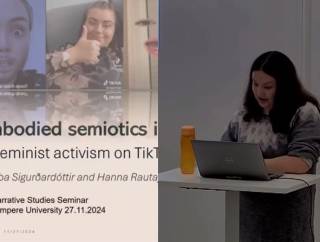
This presentation explores how TikTok has opened up new rhetorical spaces, enabling activists to creatively shape and deliver narratives tailored by the specific affordances of the platform. Our focus is on a group of feminist activists who address gender-based violence and gender inequality through multimodal short videos. We approached these videos as persuasive tools for conveying messages designed to engage and appeal to viewers through semiotically layered address. Employing digital ethnography, multimodal discourse analysis, and narrative positioning, we investigated how affective cues and bodily expressions are strategically used in visual narratives to argue the case for social change. These bodily performances create visual, interrelational positionings that convey affective evaluations and judgments about societal conditions, weaving together a network of messages that both mobilize support and strengthen identification among movement members.
The Narrative Studies Seminar is open to all interested persons. The aim of the seminar is to allow for a multi- and interdisciplinary discussion on data, methods, theories, and the state of narrative research. Sessions consist of introductory presentations by researchers from different fields studying narratives at Tampere University (up to 20 min), and general discussion.
8.11. Narrare Interdisciplinary Autumn Seminar for PhD Researchers 2024
Lunch in Päätalo cafeteria (YO Restaurant)
Evening Reception in Lyhty (Päätalo F001)
Programme
GROUP 1: ENEKEN LAANES (Room: Päätalo A05)
Chair: Aura Lounasmaa
13.15–14.45 Session I
13.15–13.45 Erika Grigorjew: Night-time care in Finnish families with young children (Comments: Mari Hatavara)
13.45–14.15 Petra Vesuri: Parents’ Narrated Experiences of Their Child’s School Refusal and the Peer Support They Receive (Comments: Hanna Rautajoki) (remote presenter)
14.15–14.45 Jaïda Hajji: Identities in dialogue: a narrative research with Muslim young women in
Johannesburg and Paris (Comments: Aura Lounasmaa) (remote presenter)
14.45–15.15 Coffee break
15.15–16.30 Session II
15.15–15.45 Iisa Aaltonen: Narratives of Independence Day of Finland (Comments: Reetta Eiranen)
15.45–16.15 Thatshisiwe Ndlovu: Generational talk: The role of storytelling in confronting apartheid trauma, healing, and peacebuilding in South Africa (Comments: Jussi Backman) (remote presenter)
16.15–16.30 Break
16.30–17.30 Session III
16.30–17.00 Josephine Eckert: [W]hereas (…) it is immaterial which regime (…) murdered them for whatever reason” – Managing contested historical narratives in the European Parliament (Comments: Matti Hyvärinen)
17.00–17.30 Hanna Horn: Narrating the Migrant Self in Digital Life Writing: On the example of T. Zamirovskaya’s digital life writing (Comments: Aura Lounasmaa) (remote presenter)
GROUP 2: MERJA POLVINEN (Room: Päätalo A06)
Chair: Laura Piippo
13.15–14.45 Session I
13.15–13.45 Joosua Lehtinen: These are the stories I tell. Isn’t that what you’re looking for?” Dave Eggers’s meta/auto/fictional strategies in A Heartbreaking Work of Staggering Genius (Comments: Elise Kraatila)
13.45–14.15 Xaver Boxhammer: Rhetorical Narratology and Procedural Rhetoric in Game Studies (Comments: Tuomas Harviainen)
14.15–14.45 Oona Lipponen: Letters from the hoped-for future of structural disability social work by people with disabilities (Comments: Arto Laitinen) (remote presenter)
14.45–15.15 Coffee break
15.15–16.30 Session II
15.15–15.45 Riikka Pirinen: Literary Epiphany in Contemporary Short Story Form: A Narrative Theoretical Approach (Comments: Natalya Bekhta)
15.45–16.15 Tetyana Kasima: Heterotopic moments of being in the short stories of Virginia Woolf, Clarice Lispector and Jhumpa Lahiri. (Comments: Esko Suoranta)
16.15–16.30 Break
16.30–17.30 Session III
16.30–17.00 Anna Murashova: Platformization of cultural production and digital affordances: reshaping the form of novel in digital age (Comments: Laura Piippo)
17.00–17.30 Veera Valta: Back on track: YouTube’s reset videos as self help narratives (Comments: Mari Hatavara)
CFP
If your PhD project involves studying narrative or if you make use of narrative methods, this announcement is for you. On Friday November 8, 2024, Narrare: Centre for Interdisciplinary Narrative Studies at Tampere University hosts its eighth annual seminar for PhD students. The seminar provides a chance to meet PhD researchers from diverse backgrounds who work on or with narrative, but also to participate in Narrare’s ongoing endeavor of developing theories, methods, and analytical tools for the field of interdisciplinary narrative studies.
The seminar papers will be commented on by the senior researchers and professors of the Centre. Additionally, our confirmed visiting scholars commenting on the workshop papers this year are Professor Eneken Laanes and Senior University Lecturer Merja Polvinen.
Proposals: We ask prospective participants to submit a proposal for a paper to be presented at the seminar. The one-page proposal should include: title, research question, target material, method and theoretical framework plus a short description of the issues the author would like the seminar to address when discussing their paper. The language of the proposals and the seminar is English.
Seminar papers & presentations: Those selected to present at the seminar are expected to send in written papers to be discussed. Papers should include an extended version (2 to 3 pages) of the proposal and a representative excerpt (2 to 3 pages) of their target material. In case the original target material is in any other language than English, we ask for you to provide a short sample (for example half-a-page) of the material translated to English. On the day of the seminar, participants are expected to present their papers briefly (max. 5 minutes) before comments and discussion.
The seminar will be held on site at Tampere University in Finland. If there is room in the program, a hybrid panel with some of the PhD participants online can be organized. Please indicate clearly in your application if you can only participate online.
Apply by sending your proposal to Markus Laukkanen (markus.laukkanen@tuni.fi) by September 13. Deadline for final seminar papers is October 25.
8.11. Open keynotes: Eneken Laanes & Merja Polvinen
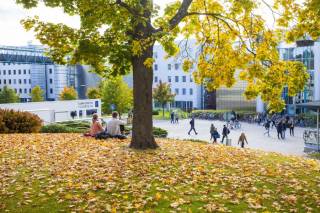
Time: Friday 8 November, 10:00–12:00
Place: Auditorium D10a, Päätalo -building (Kalevantie 4, 33100)
Keynote speeches for Narrare’s 7th annual Interdisciplinary Autumn Seminar for PhD Researchers. Keynotes are open to everyone.
10.00 Merja Polvinen: “The Kindness of Literary Houses: Fictional Narrative and Enactive Cognition”
11.00 Eneken Laanes: “Narration as Translation: Diasporic Postmemories of the Holocaust in Eastern Europe”
The event will be streamed. (Zoom link Meeting ID: 629 1123 5564 Passcode: 313514)
Abstracts:
Merja Polvinen: The Kindness of Literary Houses: Fictional Narrative and Enactive Cognition
Research in cognitive literary studies has shown how important embodiment is to our engagement with literary texts. In this talk I will focus on enactive cognition, one specific aspect of that larger project, and on how this theory gives us further conceptual tools for understanding readers’ embodied engagement with narrative fictions. I’ll first introduce the basic tenets of enactive cognitive theory and then outline how this phenomenologically oriented framework could be useful for thinking about both the life-like and the artificial qualities of literature. Enactive theory is offered as a bridge that connects readers’ embodiment and the literary texts as artefacts, and through a reading of Susanna Clarke’s novel Piranesi (2020) I present both the fictional world and the formal elements of a narrative as action potentials in a single cognitive environment.
Eneken Laanes: Narration as Translation: Diasporic Postmemories of the Holocaust in Eastern Europe
This presentation explores postmemorial documentary, autobiographical, and/or autofictional literary texts that address the memory of familial implication (Rothberg) in the Holocaust in Eastern Europe. Public remembrance of the Holocaust in this region was restricted and delayed by the Soviet regime until the 1990s. The delayed engagement with this memory following the collapse of the Soviet Union—often at both a generational and geographical remove, the latter produced by migration—has given rise to novel literary forms for addressing trauma and perpetration as eyewitness memory fades. This paper proposes the idea of narrating such memories as a process of cultural translation across generational and geographical divides. Specifically, the paper examines the non-individualistic and non-identitarian forms of these autobiographical narratives, the use of translingualism to convey memories across geographical, cultural, and linguistic divides, and a particular translational transnationalism of memory that emerges from such narration as an “omnidirectional” and disorienting translation (Dickinson). The paper also demonstrates how these narratives challenge both national and transnational memories of WWII in Eastern Europe.
Speaker Bios:
Dr Merja Polvinen is Senior Lecturer in English philology and Docent (associate professor) of Comparative Literature at the University of Helsinki, Finland. She is a former fellow of Institutes of Advanced Study at both Helsinki and Uppsala, and one of the team PIs in the consortium Instrumental Narratives: Limits of Storytelling and New Story-Critical Narrative Theory (iNARR 2018-2022). Merja’s work has focused on interdisciplinary literary studies, from complex systems dynamics in her PhD (Reading the Texture of Reality, 2008), to her current work in 2nd-generation cognitive approaches to literature. Her book Self-Reflective Fiction and 4E Cognition: An Enactive Approach to Literary Artifice (2023) is out in the new Routledge series on Cognitive Humanities.
Dr Eneken Laanes is Professor of Comparative Literature at Tallinn University and the Project Leader of the ERC project “Translating Memories; The Eastern European Past in the Global Arena”. Her research interest include transnational literature, transnational and Easter European memory cultures, memory studies, historical novel, theories of autobiography and self-writing, multilingualism. She is the co-editor of special issues “Cultural Memorial Forms” (Memory Studies, 2021) and “Perpetrators, Collaborators and Implicated Subject in Central and Eastern Europe” (SEEJ, 2023) and of the edited volume “Novels, Histories and Novel Nations” (SKS, 2015).
28.10. Guest lecture: Dorien Van De Mieroop “Conveying story evaluation through the construction of epistemic and deontic status-stance relations in direct reported speech”
28 October at 10-12
Tampere University, City centre campus, Pinni B -building, Auditorium B1097
Professor Dorien Van De Mieroop, KU Leuven
Abstract
There has been extensive research on evaluation and direct reported speech in narratives, but few studies have investigated the evaluative points narrators may convey through the sequential features of reported exchanges in their stories. In this presentation, we conduct a micro-oriented narrative analysis on how epistemic and deontic status-stance relations are depicted by narrators in sequences of reported turns. We thus uncover how hierarchies and potential transgressions between the characters in the storyworld are ‘shown’ rather than ‘told’ to the story recipients, who are in this way equipped to evaluate the story as a whole and the story characters’ accountability for their interactional behavior in particular. Furthermore, we argue that the narrators’ discursive set-up of epistemic and deontic relations in these reported exchanges also displays their emic perspective to them. Therefore, we believe that our approach is not only relevant for narrative research, but it can also help to pave the way for a novel approach to epistemics and deontics, complementing the insights gained in the conversation-analytic examination of these phenomena in situ.
9.10. 10 Years of Narrare – Panel Discussion
Join us for this special session of the Narrative Studies celebrating 10 years (and 1 day) anniversary of the founding of Narrare!
Time and Place: Wednesday 9.10. at 3:15pm (EEST) in Pinni B Room B4113 and Zoom (Link).
This session is formatted as a panel discussion with past leaders of Narrare Maria Mäkelä (Past Director), Mari Hatavara (Past Director), Samuli Björninen (Past Coordinator), chaired by Laura Piippo (Director). Why was the centre founded? How has its mission changed over the years? How has the centre impacted narrative studies at Tampere or in general? How has the field of narrative studies itself changed over the past decade? What will Narrare look like after the next 10 years, in 2034?
Celebratory cake & coffee will be served after the panel discussion.
This session, like all sessions of the Narrative Studies Seminar, is open to everyone regardless of past involvement with Narrare. The panel discussion will be streamed via Zoom (Link). (Meeting ID: 668 4700 7494 Passcode: 045076)
8.10. “Openings” A seminar on Utopia, Eastern Europe in the context of world literature and the practical politics of building a better future
“Openings”
A seminar on Utopia, Eastern Europe in the context of world literature and the practical politics of building a better future
Guest speakers: Divya Dwivedi (philosopher, Indian Institute of Technology Delhi) and Ivana Perica (literary scholar, Leibniz-Zentrum für Literatur- und Kulturforschung Berlin)
Pinni B4116, Tuesday October 8th, 2024, 10:00-12:00
Welcome to “Openings”, a kick-off seminar of the Academy Research Project “Utopia and Eastern European Literature after 1989” (PI Natalya Bekhta). Through a series of short presentations and a discussion with guests Divya Dwivedi (philosopher, Indian Institute of Technology Delhi) and Ivana Perica (literary scholar, Leibniz-Zentrum für Literatur- und Kulturforschung Berlin) we will consider the usefulness of a non-substantive approach to Utopia for an understanding of the current aesthetic and political concerns. Contemporary Eastern European literature, in the global comparative context of ‘world literature’, will offer us an entry point but the discussion will not be limited by this angle nor by any narrow disciplinary focus.
Utopia today has largely transformed from content-based, substantive visions of ideal space into more subtle traces of future-oriented desire for a better time. In this shape Utopia persists today, including in the war-torn Eastern Europe, and it is not an anomaly but a new example of what Miguel Abensour (2018) described as a revival of the Utopian impulse—an impulse “toward freedom and justice,” which is continuously “reborn in history, reappears, makes itself felt in the blackest catastrophe, resists as if catastrophe itself called forth new summations.” The rebirth of Utopia can also be translated as a rebirth of History itself in the past two decades, to use a phrase from Alain Badiou. Thus, the 21st-century upsurge in “historical riots,” such as the Arab Spring, Occupy Wall Street, the Ukrainian Maidans, Black Lives Matter or Mouvement des gilets jaunes, may signal “the emergence of a capacity, at once destructive and creative, whose aim is to make a genuine exit from the established order.” In short, Utopia as a desire, impulse and capacity – rather than concrete content and visions of ideal societies.
The problem of how to make a genuine exit from the established order, from the status quo of international politics, away from attempts to conduct business as usual on a burning planet is essentially a demand for a Utopian opening towards something better but as yet unimaginable. If the status quo “traps human beings into forgetting the very possibility that they could be other than what they were born as” (Dwivedi and Mohan 2024, 35), then a way out of such closure offers a way to anastasis, a revolutionary principle that Divya Dwivedi and Shaj Mohan describe as coming into being of a new comprehending law that allows to grasp the existence of other possibilities. Art, and literature in particular, seems to offer itself as the social artefact most readily available for an investigation of the problem of Utopian openings. At the same time, literary discourse – however progressive and iconoclastic it may (want to) be – is inevitably implicated in the literary system and the social order currently governed by the exploitative logic of capital (Ivana Perica 2024). How do we navigate the politically pressing and hermeneutically problematic topic of Utopia?
Further reading
Abensour, Miguel. 2008 [2006]. “Persistent Utopia,” Constellations 15, no. 3: 406–42.
Badiou, Alain. 2012. The Rebirth of History: Times of Riots and Uprisings. Verso.
Perica, Ivana. 2024. “Competitive Words: Identity Counts in Large Amounts.” Genealogy+Critique 10, no. 1: 1–22.
Dwivedi, Divya and Shaj Mohan. 2024. Indian Philosophy, Indian Revolution. Ed. Maël Montévil. Hurst Publishers.
2.10. Tuomas Harviainen: Projected narratives of face-to-face drug trading
This talk is a part of the Narrative Studies Seminar
Time: Wed 2 October 3:15 pm (EEST); Place: Pinni B4113 or Zoom (Link). (Meeting ID: 668 4700 7494 Passcode: 045076)
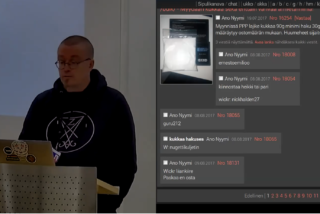
In this lecture, we discuss the use of projected narratives utilized by people engaging in face-to-face dealings of illegal narcotics. With projected narratives, we here refer to short stories about upcoming trades, used for the purpose of making the other party feel safe regarding the transaction. Such stories are short but effective. They tend to utilize elements such as past successes, risk-freeness, price, and trader ethnicity to establish that the potential encounter will go well. On the other hand, they have to rely on fiction to deliver their points, which in turn can cause the kind of inconsistent story structures that raise questions in forensic linguistics.
The Narrative Studies Seminar is open to all interested persons. The aim of the seminar is to allow for a multi- and interdisciplinary discussion on data, methods, theories, and the state of narrative research. Sessions consist of introductory presentations by researchers from different fields studying narratives at Tampere University (up to 20 min), and general discussion.
25.9. Laura Piippo: The Voice of The Platform
This talk is a part of the Narrative Studies Seminar
Time: Wed 25 Sptember 3:15 pm (EEST); Place: Pinni B3109 or Zoom (Link). (Meeting ID: 668 4700 7494 Passcode: 045076)
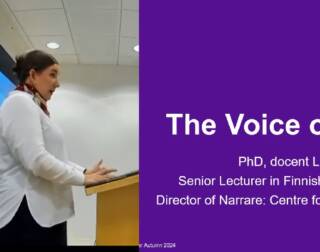
The Voice of The Platform
This talk explores the concept of the voice of the platform and how it emerges from the intersections of authors, audiences, and the user interface of digital platforms. It is imperative to refine our interpretation of how both platforms and the AI they employ influence the expression of the content we consume and how these platforms generate content and meanings imbued with human sensibilities. The analysis highlights the role social media platforms and their different affordances play in contemporary positioning and reshaping literary functions. I propose a study of how authorship and agency materialize in the digital environment, how diverse voices in the text take shape, and how the platform’s algorithmic functionality manifests in the discourse conducted on the platform. I argue that the platform’s voice is constructed not only through its affordances, such as publishing format and visual indicators of response options but also through users’ anticipatory behaviours and assumptions about the operation of platform algorithms. The analysis distinguishes between weak and strong AI, the latter being more present and relevant in the case of platforms. The platforms and their algorithms function as enigmatic entities, constituting opaque systems. Nevertheless, we may proceed with the presumption of their existence. Such assumptions play a pivotal role in engendering the outcomes of the algorithms, as individuals tailor their behaviour following presumed logic. Recognising and locating the voice of the platform is an essential tool in the critical reading of social media platforms and the ways we make sense of the (literary) debates intersecting them.
The Narrative Studies Seminar is open to all interested persons. The aim of the seminar is to allow for a multi- and interdisciplinary discussion on data, methods, theories, and the state of narrative research. Sessions consist of introductory presentations by researchers from different fields studying narratives at Tampere University (up to 20 min), and general discussion.
13.9. Rethinking Epiphany – Perspectives from the Fringes 2024
Tampere University, 13 September 2024
Location: auditorium VIRTA 109, Åkerlundinkatu 5, Tampere
The symposium “Rethinking Epiphany – Perspectives from the Fringes” is a one-day event to be held Friday, September 13, at Tampere University, Finland.
In literature, epiphany is considered as the moment of revelation, illumination, or enlightenment of a fictional character. Epiphany has been associated particularly with modernist literature, and with the foregrounding of powerful moments of heightened significance in the works of Virginia Woolf, James Joyce, and their contemporaries. This symposium considers the legacy of such “moments of being” (Woolf 1939) and proposes new perspectives to challenge or enrich our understanding of modernist forms of epiphany. It is particularly interested in interdisciplinary approaches to the study of epiphanies, as well as in how perspectives from the fringes add to our understanding of epiphany.
Keynote Speakers:
Nigel Fabb, University of Strathclyde, Glasgow, UK
Päivi Mehtonen, docent, independent scholar, Finland
The symposium was organized in collaboration with the international Fringe Urban Narratives network (Universidad de Alcalá) and the Narrare center for interdisciplinary narrative studies at Tampere University.
Organizing committee: Lieven Ameel (Tampere University), Patricia Garcia (Universidad de Alcalá), Laura Oulanne (University of Helsinki), Riikka Pirinen (Tampere University)
For full details and programme of the event, see the event webpage here: https://events.tuni.fi/epiphany2024/
9.9. Social Innovations for Sustainable Urban Development: Socially Innovative Children’s Books in Iran
Organized in collaboration with Tampere Urban Research Network for Sustainability – TURNS
- Time: Monday 9 September, at 14.00-15.30
- Venue: Tampere University Main Building, lecture room C113/C5 (Kalevantie 4, Tampere)
- Free entrance, no registration required.
In this TURNS seed event*, we delve into the questions of social innovations, literature and storytelling in the quest for more sustainable societies, cities and communities.
During the event, Dr. Hamoon Tahmassebi (Sharif Sustainable Development School, Iran) gives a presentation titled: Social Innovations for Sustainable Development: Utilizing Children’s Literature to Foster a Sustainability Mindset in Iran’s Underprivileged Cities.
Narrare’s vice director Dr. Aura Lounasmaa acts as a discussant and commentator for the presentation.
The event is part of the TURNS seed funded initiative Social Innovation for Sustainable Development in Small Cities.TURNS will provide some snacks and refreshments.
For a more detailed description, see the TURNS -website concerning the event.
15.8. Työpaja: Kieli, puhe ja kertomus: sosiolingvistiikan käsitteet, metodit ja teoriat puheen esitysten tutkimuksessa
Työpaja
15.8.2024 klo 12–16
Pinni B4113, Tampereen yliopisto
Puhetta ja puheen esityksiä tutkittaessa kielen piirteet ja niiden merkitykset nousevat avainasemaan. Niin kaunokirjallisuuden fiktiivisen puheen kuin esimerkiksi haastatteluaineistojen litteroidun puheen tutkimus pohjautuu kielen merkitysten analyysiin – oli kyseessä sitten kielen taiteellisten ja vieraannuttavien keinojen tai murrepiirteiden ja puhekielisyyden tulkinnallisen merkityksen kartoitus.
Sosiolingvistiikka on kielentutkimuksen osa-alue, jonka piirissä tarkastellaan kielenkäytön ja yhteiskunnan sosiaalisen rakentumisen suhdetta. Sosiolingvistiikan tutkimuskohteita ovat esimerkiksi kielen vaihtelu ja muuttuminen, kieliä koskevat asenteet ja käsitykset sekä monikielisyys (Nuolijärvi & Lappalainen 2020). Sosiolingvistiikka on vahvasti empiirinen tutkimussuunta, jossa kvantitatiivisin tai kvalitatiivisin menetelmin analysoidaan kielellisen variaation esiintymisehtoja, variaation funktioita ja käynnissä olevia muutoksia (ks. esim. Labov 1994; Lappalainen 2004; Lehtonen 2015; Kuparinen 2021). Suomalaisessa kontekstissa sosiolingvistinen tutkimus on tyypillisesti kohdistettu puhuttuun kieleen, mutta viitekehys tarjoaa näkökulmia myös kirjoitettuun puheeseen (ks. esim. Tiittula & Nuolijärvi 2013).
Kirjallisuudentutkimuksessa fiktiivisiä puheen esityksiä on perinteisesti tutkittu kielen tyylillisen rekisterin kautta, jolloin kielen piirteet nähdään lukijan tulkintaa ohjaavana ja erityisesti henkilöhahmoa rakentavana piirteenä. Tällöin puheen ominaispiirteet – murteet, puhetavat ja sanavalinnat – toimivat joko hahmoa yksilöivänä tai tiettyyn yhteisöön liittävänä tekijänä (kts. esim. Page 1988; Fowler 1977; Leech & Short 1981). Toisaalta kielen piirteet ja hahmon yksilöllisen kielen esitys ovat oleellinen osa myös narratologialle keskeistä kysymystä henkilöhahmon ja kertojan diskursseista ja niiden eroavaisuuksista (ks. esim. Cohn 1978; McHale 1978). Todellisen kielenkäytön rinnastamisen ja kielen vakiintuneiden funktioiden sijaan etenkin narratologiassa painotetaan kuitenkin kielen muodon ja tulkinnallisen funktion vakiintumattomuutta (vrt. Sternberg 1982) ja tyypillisen kielen esitystä alkuperäisen sijaan (vrt. Fludernik 1993).
Monitieteisessä työpajassa keskustellaan esitelmien pohjalta siitä, kuinka sosiolingvistiikan käsitteitä, teorioita tai metodeja voi soveltaa kirjallisuuden- ja kertomuksentutkimuksessa. Esimerkkiaineistot sisältävät sekä fiktiivistä että ei-fiktiivistä puhetta. Työpajan puhujat edustavat kielen-, kirjallisuuden ja yhteiskuntatieteiden tutkimusta. Tapahtuma järjestetään yhteistyössä Tutkimuskeskus Narraren kanssa.
Ohjelma
12.15–12.30 Alustus: Maria Mäkelä
12.30–13.00 Anna Kuutsa & Riikka Pirinen: Avioliittokysymys Maria Jotunin ja Katherine Mansfieldin modernistisissa novelleissa: suora ja vapaa epäsuora esitys yksilöllisen ja odotuksenmukaisen puheen kuvaajana
13.00–13.30 Roni Hermo: Tarinoin rakennettu porilaisuus – Median representaatiot murteen imagoa vahvistamassa
Kahvitauko 30 min
14.00–14.30 Linda Nurmi: Vapaa suora esitys ja puhekielen piirteet Raija Siekkisen pienoisromaanissa Se tapahtui täällä
14.30–15.00 Laura Tammilehto: Kaunokirjallisuuden murre: keksittyä puhetta, aitoa murretta, silta maailmojen välillä
15.00–15.30 Matti Hyvärinen: Odotuksen osoittimet ja vastakertomus
15.30–15.45 Loppupuheenvuoro: Liisa Mustanoja
Tapahtuma on avoin kuulijoille, tervetuloa!
29.5. Markus Laukkanen: “Discursive-Narratological Approach to Internet-Age Storytelling: Negotiating the Meaning of Game of Thrones”
This talk is a part of the Narrative Studies Seminar
Time: Wed 29 May 2:15 pm (EEST); Place: Pinni B3109 or Zoom (Link). (Meeting ID: 668 4700 7494 Passcode: 045076)
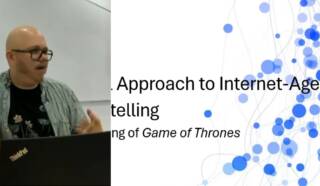
Discursive-Narratological Approach to Internet-Age Storytelling: Negotiating the Meaning of Game of Thrones
In the storytelling environment of the internet, participants of online discourse can take part in co-constructing narratives (see Georgakopoulou 2007; Page 2018). The impact of this phenomenon is most often studied in the context of non-fictive narratives shared over social media. The aim of this talk is to explore the effect of the story-logic of social media (see Dawson & Mäkelä 2020) on works of fiction as well through the case study of HBO’s immensely popular TV-series Game of Thrones (2011–2019). I approach this topic in the spirit of discursive narratology as outlined by Paul Dawson, taking as my starting point the premise that “a work of fiction is a public statement which circulates in the same discursive formulation as its author’s nonfictional statements” (Dawson 2013, 236). From this perspective Game of Thrones, too, is a part of public discourse taking place on the internet, finding its meanings there. In this talk, I will address online debates regarding the series’ relationship to issues like gender and feminism as well as climate change as instances of co-construction through narrative contestation.
The Narrative Studies Seminar is open to all interested persons. The aim of the seminar is to allow for a multi- and interdisciplinary discussion on data, methods, theories, and the state of narrative research. Sessions consist of introductory presentations by researchers from different fields studying narratives at Tampere University (up to 20 min), and general discussion.
22.5. Guest Lecture “Literary Value in a Postliterary Age: Contemporary Grammars of Valuation” by Pieter Vermeulen
Guest Lecture by Pieter Vermeulen
Wednesday, 22 May, 13:15-15:15, Tampere University,
Room: Pinni B 1096 (Kanslerinrinne 1)
Literary Value in a Postliterary Age: Contemporary Grammars of Valuation
The value of literature is no longer self-evident. For those of us who are invested in the survival of literature, this puts us in a tricky position: we have to justify the value of literature in nonliterary terms, but we must also make sure that those nonliterary value domains (ethics, politics, memory, identity) don’t make literature redundant. In this presentation, I explore how this paradoxical situation invites us to center the question of literary value. I argue that it is less important to define literary value than to track concrete discursive practices of valuation. By putting discourses of valuation at the heart of the study of contemporary literature, we can arrive at a better explanation for the emergence of some of the dominant modes of twenty-first-century fiction such as the literature of witness, the network novel, biofiction, or autofiction.
The lecture will be followed by a series of responses from Natalya Bekhta, Kuura Juntunen, Maria Mäkelä, and Matti Kangaskoski, as well as general discussion.
Suggested reading: Pieter Vermeulen “Reading for Value: Trust, Metafiction, and the Grammar of Literary Valuation,” PMLA 2023, 138:5. (Link to the article)
Pieter Vermeulen is an associate professor of American and comparative literature at the University of Leuven. He is the author of three books (Romanticism after the Holocaust [2010]; Contemporary Literature and the End of the Novel: Creature, Affect, Form [2015]; and Literature and the Anthropocene [2020]) and co-editor of several special journal issues and books (most notably Memory Unbound: Tracing the Dynamics of Memory Studies [2016], Instituting World Literature: Writing, Translation, Markets [2016], and Pluralizing the Minor: Forms, Figures, Circulation [2024]). His current writing project is a book on contemporary literary value on which this presentation draws.
17.5. Evening with Narrare: Networking, Socialising & Sauna

Come meet (other) scholars working with or interested in narrative research!
Welcome to research centre Narrare’s Networking, Socialising & Sauna evening on Friday 17 May 2024 at Majaranta sauna -venue in Hervanta.
Arrive from 4 pm onwards.
Brief welcoming words and introductions at 5 pm. Mingling by the fireplace.
The sauna, for those interested, will be warm from 6 pm onwards. A swimsuit or a towel must be worn while bathing: remember to bring your own swimsuit and towel. Majaranta is located by lake Hervantajärvi so swimming is also possible.
The venue is easily accessible by public transport. There is a 10-minute walk from the final stop (Hervantajärvi) of tram number 3 to the sauna (Salmenkalliontie 70).
Please register through this link (click here) on 15 May 2024 at the latest.
There will be light snacks served, but you should bring your own sauna drinks. There is a barbeque available if you want to bring your own sausages or other snacks.
Everyone is welcome regardless of career stage and previous engagement with narrative studies or Narrare.
15.5. Reetta Eiranen: “Narrations of Collective Experience in the Nineteenth-Century”
This talk is a part of the Narrative Studies Seminar
Time: Wed 15 May 2:15 pm (EEST); Place: Pinni B3109 or Zoom (Link). (Meeting ID: 668 4700 7494 Passcode: 045076)
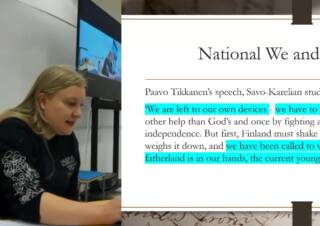
Narrations of Collective Experience in the Nineteenth-Century
The paper focuses on we-construction and we-narrations in different kinds of nineteenth-century sources. The aim is to apply narrative methods to historical research and especially in the history of experience. In my previous research, I have looked into the concept of self-narration as a way of constructing oneself and one’s experience. Now, I want to test out the narratological concept ‘we-narration’ for the same purpose, but this time in we-construction and in the construction of collective experiences (see Bekhta 2017). My interest lies especially in the construcion of national communities and ‘national we’. I will present examples of different kinds of we-uses in various historical sources that I have used in my research on the intelligentsia of the nineteenth-century Grand Duchy of Finland. I will address, for instance, documents of ladies’ societies and student associations as well as private correspondence between family members and friends. It seems that we-uses are more common when the tone is programmatic, emotional, national, sublime or religious. We-construction is often done in relation to the (implied) other based on, for instance, nationality, class, gender or age.
The Narrative Studies Seminar is open to all interested persons. The aim of the seminar is to allow for a multi- and interdisciplinary discussion on data, methods, theories, and the state of narrative research. Sessions consist of introductory presentations by researchers from different fields studying narratives at Tampere University (up to 20 min), and general discussion.
25.4. Funding Workshop for Doctoral and Early Career Researchers
The funding workshop offers practical tips and insights on how to successfully apply for funding especially from the Finnish foundations (e.g., Kone Foundation, The Finnish Cultural Foundation) as well as support from both experts and peers.
In the first part of the workshop, Research Specialist Maija Ojala-Fulwood (SOC) gives an introduction to writing a successful funding application and to the services offered by the university. After this, Doctoral Researcher Anna Kuutsa (Literary Studies) and Postdoctoral Researchers Usva Friman (Game Culture Research) and Iuliia Gataulina (Politics and Political Economy) share their personal experiences of successful funding applications for doctoral and early career postdoctoral research.
The second part of the workshop focuses on more practical work. The participants have the unique opportunity to read and discuss funding applications that have been submitted to the Finnish foundations and get feedback for their own research ideas. For this part of the workshop, participants are expected to bring an abstract-length description (max. 2000 characters) of their own research idea or project either in English or in Finnish.
Please register through this link (click here) on 19 April 2024 at the latest. There will be coffee/tea and vegan snacks served.
For more information on the workshop, please contact Narrare’s coordinator Markus Laukkanen (markus.laukkanen(at)tuni.fi).
10.4. Jussi Backman: “After the Ends of History: A Look at Historical Metanarratives vs. Micronarratives in Contemporary Political Thought”
This talk is a part of the Narrative Studies Seminar
At the end of the Cold War, Francis Fukuyama presented his provocative thesis of liberal democracy as an “end of history,” as the culmination of political history in a system of maximal freedom and mutual recognition. Fukuyama invokes the teleological philosophy of history of Hegel, Marx, and Alexandre Kojève that sees the historical process as fueled by intellectual, social, and economic contradictions whose ultimate resolution will remove the driving force behind substantial historical transformations. Fukuyama’s thesis contrasted conspicuously with Jean-François Lyotard’s equally provocative 1979 diagnosis of the ongoing loss of credibility of grand “metanarratives” – post-Hegelian teleological and totalizing narratives of universal history – as a result of the increasing fragmentation of knowledge. Instead of an end of history, Lyotard predicts the end of History as a universal narrative and its replacement by “small narratives” or micronarratives – local histories whose limited scopes accommodate the existence of other, incommensurate narratives. In the light of Heideggerian and Gadamerian philosophical hermeneutics and Foucauldian discursive genealogy, micronarratives can here be understood as a heuristic, temporary, and situated narrative interpretations that are never total or definitive, but are constantly being renarrated for the changing purposes of changing presents.
I suggest that the dispute between grand and small narratives of history is an ongoing one and an aspect of the wider complex conflict between the legacies of the Enlightenment and the Counter-Enlightenment. The primarily theoretical and intellectual conflict has a central and volatile political dimension. While the critique of totalizing metanarratives has typically been seen as an emancipatory critique and can be connected to Hannah Arendt’s analysis of the structure of totalitarian ideology, it has in recent decades been associated with “post-truth” phenomena and has also been increasingly appropriated by radical-conservative and “ethnopluralistic” ideologists such as Alain de Benoist and Aleksandr Dugin. An example of an opposite but no less controversial historical narrative strategy is Steven Pinker’s recent rehabilitation and vindication of Enlightenment universal progress narratives.
The Narrative Studies Seminar is open to all interested persons. The aim of the seminar is to allow for a multi- and interdisciplinary discussion on data, methods, theories, and the state of narrative research. Sessions consist of introductory presentations by researchers from different fields studying narratives at Tampere University (up to 20 min), and general discussion.
26.3. Master class: Academic writing with Professor Eric Hayot (Penn State University)
Tampere University, 26 March 2024, 10-12, Päätalo D13
Eric Hayot’s The Elements of Academic Style (2014), a handbook for writing academic research in humanities fields, is widely taught in graduate programs around the world. In this master class Hayot will focus on the book’s central structural and stylistic figure: the Uneven U. The Uneven U is a model for the construction of paragraphs, articles, chapters, and entire books. We will go through the U’s basic structure and work on several practical examples. The goal is to have everyone leave the room a stronger and more confident writer.
The master class welcomes doctoral researchers, faculty and anyone interested in a reflection on the way we write as well as in practical tips on how to develop one’s academic style. The event is sponsored by the Tampere Institute for Advanced Study and carried out in collaboration with Narrare: Centre for Interdisciplinary Narrative Studies.
Eric Hayot is Distinguished Professor of Comparative Literature and Asian Studies at Penn State University and Director of Penn State’s Center for Humanities and Information. He specializes in a wide range of topics, including world literature, information theory and modernism. Hayot’s publications include a monograph on Literary Worlds (2012), which unites classical narrative theory and the latest debates in comparative literature in a groundbreaking investigation of worldedness, and A New Vocabulary for Global Modernism (co-edited with Rebecca L. Walkowitz, 2016). His most recent monograph on Humanist Reason (2021) examines the current resistance to the idea of knowledge as it emerges from within the humanities.
Registration link HERE.
Master class reading: Eric Hayot, The Elements of Academic Style: Writing for the Humanities (Columbia UP, 2014). Excerpts will be emailed to those registered for the master class.
Contact: Natalya Bekhta (natalya.bekhta@tuni.fi), Tampere Institute for Advanced Study
25.3. Research Workshop “Contemporary Theory in the End Times”
Tampere University, Monday 25 March, 14:30-16:30 Pinni B4113
Following the keynote lecture, Eric Hayot will lead a research workshop on the role of literary theory today. This broad frame unites four presentations of the work-in-progress by the researchers from the Tampere Institute for Advanced Study, Narrare: Centre for Interdisciplinary Narrative Studies and the University of Helsinki. At a time when the familiar aesthetic categories no longer work and the narrative form itself is strained by the temporality of a perpetual present without a livable future, immediacy seems to have become the cultural dominant of our age (Kornbluh 2024). Its consequences include valorizations of instantaneity and authenticity, narrative privileging of the first-person point of view, dissolution of medium and mediation up to a weakening of theory’s ability to interpret and understand cultural and social reality. Zooming in on these concerns, we shall consider several of their specific aesthetic, narrative and formal dimensions. Immersion, form and new formalism, utopia and apocalypse: which concepts, categories and tropes can productively guide contemporary theory in its grasp of the present and possibilities inherent in it?
Workshop speakers:
Lieven Ameel, Natalya Bekhta, Merja Polvinen, Candela Potente
Please register HERE.
Contact: Natalya Bekhta (natalya.bekhta@tuni.fi), Tampere Institute for Advanced Study
25.3. Guest Lecture: “The End of Aesthetic History; or, Provincializing Modernism” by Eric Hayot (Penn State University)
Tampere University (Pinni B1097).
Monday 25 March, 12-14.
What would it mean if modernism were over? At this distance from the aesthetic events of the previous century, in a time when the rhythm of periodization seems to have halted – so that we are stuck in an endless “contemporary” moment – is it possible to understand modernism (and indeed much of the aesthetic history of capitalism) in a new way? This talk begins by discussing how the formal drives of modernism were always destined for a certain kind of “end” of the aesthetic. It considers the impact of the historical expectations created by the last few centuries on academic criticism’s own formation. It wonders, finally, how a historically provincialized (but geographically expansive) modernism ought to shape our understanding of the history of capitalist aesthetics.
Eric Hayot is Distinguished Professor of Comparative Literature and Asian Studies at Penn State University and Director of Penn State’s Center for Humanities and Information. He specializes in a wide range of topics, including world literature, information theory and modernism. Hayot’s publications include work on Chinese literature and culture in a global comparative perspective, a monograph on Literary Worlds (2012), which unites classical narrative theory and the latest debates in comparative literature in a groundbreaking investigation of worldedness and world-literary theory, and A New Vocabulary for Global Modernism (co-edited with Rebecca L. Walkowitz, 2016). Hayot has co-edited Information: A Reader (with Anatoly Detwyler and Lea Pao, 2022), which together with its companion volume, Information: Keywords (2021), offers a systematic introduction to this concept not simply as a challenge for the humanities today but as an integral part of any humanist investigation of social and cultural phenomena. His most recent monograph on Humanist Reason (2021) lays out the historical context of the current resistance to the idea of knowledge as it emerges from within the humanities and illuminates the knowledge-creating practices that characterize humanist reason, arguing for their present and future use.
The event is sponsored by the Tampere Institute for Advanced Study and organized in cooperation with Narrare: Centre for Interdisciplinary Narrative Studies
Contact: Natalya Bekhta (natalya.bekhta@tuni.fi), Tampere Institute for Advanced Study
20.3. Caesy Stuck: “A Narratological Perspective on Human-Nonhuman Hybridity in Literary Fiction”
This talk is a part of the Narrative Studies Seminar
Time: 2:15 pm (EET); Place: Pinni B4113 or Zoom (Link). (Meeting ID: 668 4700 7494 Passcode: 045076)
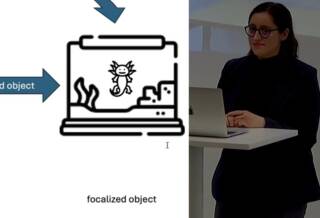
A Narratological Perspective on Human-Nonhuman Hybridity in Literary Fiction
Narratives about human-nonhuman transformations fulfil a variety of functions. They often address problematic relationships of humans to their environment and other living things or provide the reader with a putative experience of “what is it like.“ Through the mode of representation, these narratives do not simply present a binary transformation from human to nonhuman and vice versa but rather processes of hybridization that negotiate epistemic and ontological boundaries between human and nonhuman.
In her presentation, Caesy Stuck introduces a theoretical framework for discussing three types of human-nonhuman hybrid narratives and a tool for focalization to describe them. This framework is concerned with the deictic field of the focalizer, to describe changes in perspective in human-nonhuman hybrid transformations when the focalizer and/or mode of focalization do not change.
13.3. “Making Narratives Appear and Matter: Algorithms as Organizational Logic”
This talk is a part of the Narrative Studies Seminar
Time: 2:15 pm (EET); Place: Pinni B4113 or Zoom (Link). (Meeting ID: 668 4700 7494 Passcode: 045076)
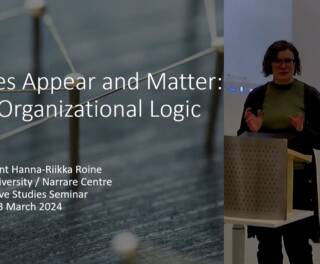
Making Narratives Appear and Matter: Algorithms as Organizational Logic
As central cultural practices of reading and writing are fast becoming processes that rely on digital platforms, it is increasingly evident that the principles behind algorithmic operations are never neutral. They affect human capacity for sense-making, guiding us, for instance, to approach the world as data that can be modeled in many alternative ways. Although digital platforms have been identified as elementary in conveying our experiences to others in narrative form, narratologists have not sufficiently engaged such algorithmic effects. In her presentation, Roine discusses algorithms as organizational logic, producing the conditions through which data on digital platforms are put into forms of meaningfulness. For narrative theory, this means asking what kind of logics make narratives, as patterns of meaning, appear and matter on these platforms.
31.1. Aura Lounasmaa: “Can Stories Affect Social Change? Participatory and Collective Narratives of (Forced) Migration”
This talk is a part of the Narrative Studies Seminar
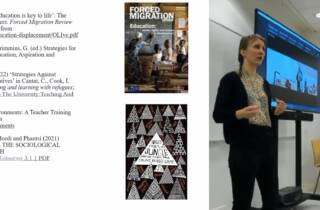
Time: 2:15 pm (EET); Place: Pinni B3109 or Zoom (Link). (Meeting ID: 668 4700 7494 Passcode: 045076)
Between 2015 and 2022 I worked in various projects in the UK and Northern France that engaged forced migrants in participatory arts-based and educational activities. Story-telling and multimodal narrative practices were used across the projects, as we understood their potential for opening creative, relational spaces in which refugees were able to negotiate their positioning within racialised power imbalances (Esin and Lounasmaa, 2020).
In this presentation I reflect on the potential of creative writing, collective story-telling practices, co-authoring with refugees and multimodal narratives in both social justice settings and as part of critical pedagogy. I draw on examples of cocreation with refugee participants in these projects, reflecting on what they can tell us about the right to narrate (Bhabha, 2000), narrative as sense-making and self-making (Bruner, 2002) and dialogical education models (Freire, 1979).
Narrative Studies Seminar Programme (Spring 2024)
Time: selected Wednesdays at 2:15–3:00 pm EET/EEST.
Location: Pinni B (room number in brackets after each item) or Zoom (Link)
The Narrative Studies Seminar is open to all interested persons. The aim of the seminar is to allow for a multi- and interdisciplinary discussion on data, methods, theories, and the state of narrative research. Sessions consist of introductory presentations by researchers from different fields studying narratives at Tampere University (up to 20 min), and general discussion.
Programme:
31.1. Aura Lounasmaa: “Can Stories Affect Social Change? Participatory and Collective Narratives of (Forced) Migration” (B3109)
13.3. Hanna-Riikka Roine: “Making Narratives Appear and Matter: Algorithms as Organizational Logic” (B4113)
20.3. Caesy Stuck: “A Narratological Perspective on Human-Nonhuman Hybridity in Literary Fiction” (B4113)
10.4. Jussi Backman: “After the End of History: Hermeneutic Philosophy of History, Micronarratives, and Their Role in Contemporary Political Theory” (B4115)
15.5. Reetta Eiranen: “Narrations of Collective Experience in the Nineteenth-Century” (B3109)
29.5. Markus Laukkanen: “Discursive-Narratological Approach to Internet-Age Storytelling: Negotiating the Meaning of Game of Thrones” (B3109)
